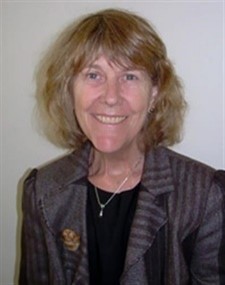
Tribute to Professor Marcia Rioux (1947-2021)
Trevor R. Parmenter and Ivan Brown
Today, we share sad news with you about the recent passing of Marcia Rioux. For many years, Marcia was a member of IASSIDD’s Council and Executive Committee, an IASSIDD Fellow since 1996, and a major influence in the growth of our Association.
 Marcia’s became a member of Council as the representative of the Roeher Institiute in Toronto, Canada when she became its President, following the untimely death of its founder Alan Roeher shortly after the close of our 1982 Congress. Marcia was a strong advocate – and lively debater – for the Association, then known as IASSMD, to move from what she perceived as its medical research bias towards a broader conceptualization of disability.
Marcia’s became a member of Council as the representative of the Roeher Institiute in Toronto, Canada when she became its President, following the untimely death of its founder Alan Roeher shortly after the close of our 1982 Congress. Marcia was a strong advocate – and lively debater – for the Association, then known as IASSMD, to move from what she perceived as its medical research bias towards a broader conceptualization of disability.
Marcia will be well remembered internationally as a long-time and tireless advocate for disability rights. Among an extensive array of advocacy work, her strong support of the International League of Societies for Persons with Mental Handicap (now Inclusion International) will long be appreciated. She was an indefatigable advocate who always strove to build a bridge between science and humanity.
With strong Human Rights and legal perspectives, Marcia significantly influenced the broadening of the path of research in our field. One example of this that stands out is her joint editorship in 1994 of Disability is Not Measles: New Research Paradigms in Disability with Michael Bach. This publication brought together contributions from a number of the presenters to a Forum on New Research Directions and Paradigms at the 9th Congress of IASSMD held on the Gold Coast, Australia in 1992. In the Foreword to the book, Marcia and Michael commented: Having worked from a human rights and equality paradigm in Canada in carrying out research on public policy and disability, we were curious to make connections with other researchers who were also re-examining the premises of the study of disability. The IASSMD provided us with a place to begin those discussions on an international level and to begin thinking about the implications and challenges for traditional researchers.
Marcia made very extensive contributions to scholarly literature and thinking. For example, she was one of the co-authors of Just Technology? From Principles to Practice in Bio-ethical Issues, jointly sponsored by ILSMH and the Canadian Association for Community Living and published by the Roeher Institute in 1994. It’s another historical coincidence that a Bioethics Symposium was also held in conjunction with the 9th Congress of IASSMD in 1992 to which Marcia contributed.
More than this, though, her life work demonstrated a rare talent of combining progressive conceptualizations of disability and research outputs with positive practical application. With an ear always open to understanding the lived experiences of people with disabilities and their families, she initiated and promoted helpful on-the-ground projects in several countries. At the same time, she clearly understood – and acted to influence – the role of laws, policy, and philosophy on how we think about and react to disability. As just one of many examples, she was a frequent visitor “down under” where she strongly influenced the development of Australian disability policy.
Marcia’s extensive work as President of the Roeher Institute was based on a social justice approach, and featured an interesting blend of comtemporary philosophy, a public policy focus, rights advocacy, research, and applied projects. Marcia was later appointed head of the School of Health Policy and Management at Toronto’s York University and director of its Institute for Health Research. Part of her “deal” in accepting this position was the establishment of a graduate program in critical disability studies, a program that has educated numerous young professionals in our field. Her exemplary work at York University – and well beyond – earned her the designation of Distinguished Research Professor. Marcia’s broad expertise and wide recognition brought her many other honours as well: a Queen Elizabeth II Diamond Jubilee Medal, the Ontario Lieutenant Governor’s Community Volunteer Award (2013), and the Order of Canada (2014), among other awards.
Perhaps even more important than the astonishing strength of her professional work, Marcia was an all-out humanitarian at heart and a very good friend to all who knew her. Her buoyant manner, readiness to see the humour in a situation, and ability to spark a spirited friendly conversation on almost any topic made her a warm and wonderful companion over lunch or a glass of wine. Her numerous colleagues, students, and friends – who all had their unique experiences as part of Marcia’s life – will miss her abundant spirit and well-founded points of view.
Marcia’s legacy is surely her remarkable positive influence on the field of disability, and on its place within international societies. We can be proud that IASSIDD was one of the vehicles through which she was able to work and advocate so tirelessly yet so insightfully.
Vale, dear friend.
Marcia Rioux obituary:
https://www.legacy.com/obituaries/thestar/obituary.aspx?pid=200217084